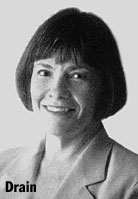

| Originally published in Current, Jan. 20,
1997 By Karen Everhart Bedford Margaret Drain's top goal as the new executive producer of WGBH's American Experience is to secure a steady source of income for the series. "Underwriting is such a critical issue for us," she said last week. Since losing the insurance firm Aetna as its sole underwriter several years ago, corporate support for The American Experience has been limited and year-to-year. The series' presence on the air has been cut back to 13 original hours a year. "It kills me, being on the air for such a short period." "We're such an attractive buy," added Drain. "It's a mystery to me why we don't have steady corporate funding." In her previous job as senior producer of the series, Drain supervised the production of more than 70 hours of American Experience documentaries. Like her predecessor as e.p., Judy Crichton, Drain was a CBS News veteran when she joined WGBH to start up the first television series devoted to history. She began her television career working with Fred Friendly and Bill Moyers. Drain's promotion to e.p. became official on Jan. 1 [1997]. She's since filled her old job by hiring Mark Samels, executive producer of the West Virginia history series while at WNPB, Morgantown. Last week, she completed a business trip to London, where she met with potential coproduction partners. "We're at a point now where American Experience is recognized. Every single broadcaster [in London] knew The American Experience and the programs we've done," she recalled. "I'd like to extend that to the American viewing audience." Among the most successful programs that captured the public's imagination have been presidential bios. With two more of those moving along the pipeline -- multi-hour films on Presidents Truman and Reagan will air next fall and winter, respectively -- Drain is planning a new series of biographies on great American generals. A profile of Gen. Douglas MacArthur, probably produced by Austin Hoyt, will launch the series "within a couple of years." Each bio will look intimately at each general's life and, for people who know little about military history, examine "what made them such great generals," said Drain. Later films will profile Gens. Patton, Lee and Grant. Among the single-hour programs to air within the next year are documentaries on the influenza epidemic of 1918 and on the struggles of Dustbowl survivors who didn't flee the southwest. Also in the works is a film about Carl Fisher, a midwestern inventor who created Miami Beach, and a documentary about the toils of the laborers and engineers who built the Hoover Dam. Viewership of The American Experience, which is consistently above PBS’s primetime average, is "pretty good," said Drain. "What we've done has served us well." But she sees threats in the aggressive promotion strategies of A&E and the upstart History Channel. "The market is getting much more competitive, and you have to have good stories. It's something that we're paying closer and closer attention to." A&E spends more money promoting its weeknightly Biography series than American Experience's entire production budget, she noted. "We have to be more aggressive to get our name out there, which is hard to do without any promotion money." The funding situation, she added, is not entirely doom and gloom. Stern's Miracle Gro recently renewed its contract with WGBH to underwrite both American Experience and Victory Garden. Renewal talks are also underway with the Sloan Foundation, which supports programs emphasizing technology. "We could use another underwriter, basically," she said. I'll talk to anybody. I'm going to follow through on every lead and try to put together a package that's attractive to corporations.' Larry D'Onofrio, national sales director for WGBH, said American Experience's difficult quest for corporate underwriting continues because many companies take a peculiar approach when commiting funding to public broadcasting -- they look for affinities with program content. "What fascinates me is how a company can buy advertising in a variety of places without giving a thought to what's on, but when they look at public broadcasting, they migrate to a program because they have ties to the subject matter." In American Experience's case, "nobody is in the history business," he added. "The failure is really our failure, systemwide, to convince people that they should be buying American Experience for the same reason they buy Murder She Wrote or 60 Minutes or any other big, primetime series." "We have the best demographics on television, and we haven't done a good job of convincing media buyers that it's a good way to reach their target." |
 |
![]()
![]() Current Briefing on history on
public TV.
Current Briefing on history on
public TV.
![]() Drain's predecessor, Judy Crichton, sees a
rising level of craftsmanship in historical documentaries.
Drain's predecessor, Judy Crichton, sees a
rising level of craftsmanship in historical documentaries.
![]()